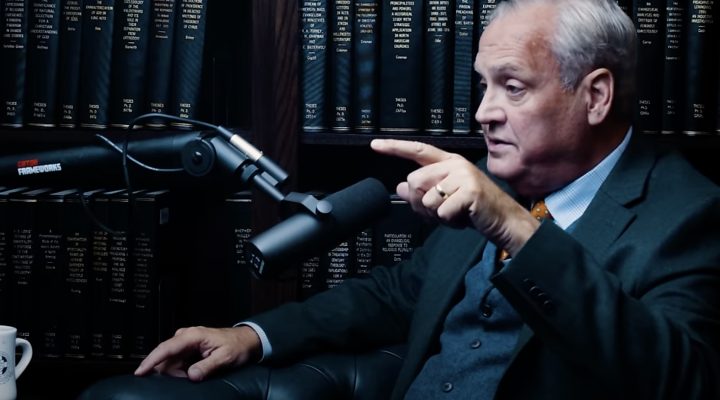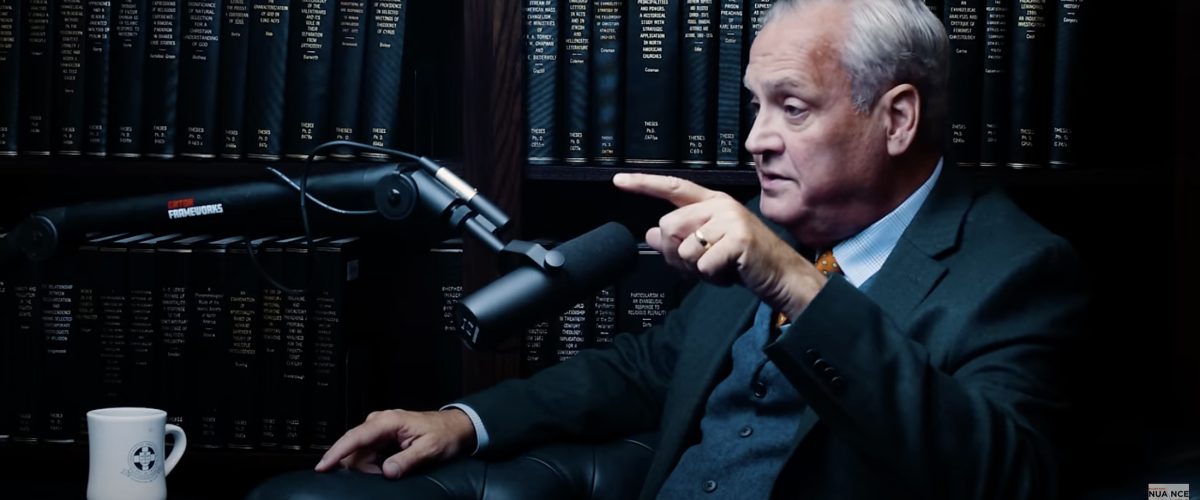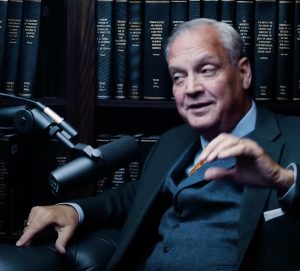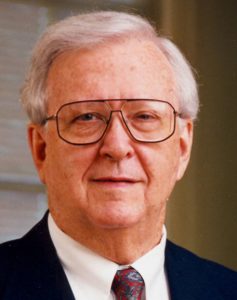Al Mohler has to “hope and pray” Jimmy Carter is a born-again Christian, he told a conservative podcaster in a wide-ranging interview.
But the president of Southern Baptist Theological Seminary had no qualms about voting for Donald Trump for U.S. president twice, he said on the “Room for Nuance” video podcast.
Toward the end of the nearly three-hour interview with Sean DeMars, lead pastor at Sixth Ave Church in Decatur, Ala., Mohler responded to a listener question: “Do you think that Jimmy Carter is a born-again Christian?”

Former U.S. President Jimmy Carter works at a Habitat for Humanity building site in Memphis, Tenn., Nov. 2, 2015. . (AP Photo/Mark Humphrey)
Carter, a former Southern Baptist, is by all measures the most devout and churchgoing president in modern history. But Mohler couldn’t say for sure whether the 100-year-old is “born again.”
“I have to hope and pray,” he replied. “So I’ve had some personal engagements with the former president. He has mentioned me in four books. Negatively. … He’s not a fan of the conservative resurgence in the SBC. And remember, I got into the thickest controversy early in my life in Georgia where I was editor of the paper, which guess what? Jimmy Carter’s in Georgia and cares a lot about Georgia.”
Mohler described Carter as “like your typical SBC deacon in a more liberal church.”
A major theme of the interview was about Mohler’s embrace of conservativism and Calvinism and the early battles he fought at Southern Seminary to rid the school of its “liberal” faculty.
On Donald Trump
In 2016, Mohler was a never-Trumper who warned of the Republican candidate’s moral and ethical failings. But by 2020, Mohler flipped and spoke in favor of Trump’s reelection — a position he held again in 2024.
He didn’t technically “endorse” Trump, he said. “I did say who I was going to vote for in a public statement.”
And he has no regret in voting for Trump twice, he explained.
“I don’t regret either one of these. I regret actions taken by Donald Trump, but I don’t regret this in that. I’ve been at this a long time. I think honesty is paramount. I think I’ve been about as clear as I could be. I’m editor also at World Opinions and I’ve been saying consistently ever since 2020, we need a nominee other than Donald Trump for the Republican Party. I did not get that.
“And so if I’m looking at the race, and as I say, I’ve tried to help people to understand it’s not just electing a president, you’re electing a government. We’re increasingly like a parliamentary system and you’re electing policies. And it’s not a situation in which I have felt like we have had a situation in which you’ve had a stellar character and a horrible character. I think we’ve had two horrible characters, and I don’t want to minimize in any way Donald Trump’s inadequacies, his moral faults, his sin. I’ll just tell you, I am close enough to the situation where I’m not going to say that Joe Biden and Kamala Harris are less complicated morally, I would say they’re less complicated in terms of how they play the political game.”
“I’m not going to say that Joe Biden and Kamala Harris are less complicated morally.”
When he first spoke in favor of Trump as president, Mohler received harsh criticism for the perceived inconsistency of his 1998 stance that Immanuel Baptist Church in Little Rock, Ark., should kick out President Bill Clinton as a member because of his sexual liaison with a White House intern.
In his own mind, Mohler has been consistent across the years.
“I think my priorities stay pretty much the same. If there’s an incongruity, it’s what I would do with Bill Clinton in the 1990s when I went on Larry King Live so many times and CNN and all these things and called for Bill Clinton to resign. I don’t think that was the wrong thing to do. I do think the political landscape has changed. I want to be honest. I think I would have to say that if you had a situation in which you had genuinely distinct characters and character is just say sexual morality, that I think as a Christian that’s going to be an excruciating position to be in. I just don’t think that’s what we’re dealing with here. I didn’t think in 2016 that Donald Trump would do what he said he would do in terms of Supreme Court appointments and other things. Well, he did it.”
Thus, despite Trump’s well-documented sexual abuse and extra-marital affairs, at least Trump doesn’t support abortion, Mohler reasoned.
“I think that’s determinative when you look against Joe Biden, who had, just over the course of the 2019-2020 campaign, really showed his true colors on abortion. … Well, that really wasn’t a hard decision for me and it wasn’t a hard decision in 2024 either.
“I understand that I’m going to be horrified, I think, by many things Donald Trump does and says, already have been, but I mean, even since the election, just days before we’re having this conversation, I have to look at what I hope is right for the greater good of the society over time.”
Always a conservative
Another theme of the interview is how Mohler sees himself as a consistent conservative across all time, from childhood to the present. He almost was lured in by the siren song of Southern Seminary’s former liberalism while a student there, but he resisted, he said.
As a high school student in Florida in the 1970s, he campaigned for Republican candidates including Ronald Reagan and went to the school library regularly to read the National Review, then the flagship publication for political conservatives. However, he describes himself as “more conservative” than William Buckley, founder of National Review.
For a while, young Mohler considered a career in politics but turned away from that because he sensed a Christian vocation calling and because he saw the dirty side of politics: “Being a volunteer, just a teenager in the room and watching politicians make deals and right out in the open. They don’t care if a teenager sees it, bringing ’em coffee, just the whole feel of it.”
Destiny as seminary president
While those close to Mohler as a seminarian often joke that he would have been president there regardless of which way the “conservative resurgence” went, Mohler sees it differently.
“God’s will in my theology is something that we find out when there’s an opportunity and we are drawn to it.”
“God’s will in my theology is something that we find out when there’s an opportunity and we are drawn to it. And so I’m here because there was an opportunity and I was drawn to it. So I didn’t premeditate as a 17-year-old believer to become president of the Southern Baptist Theological Seminary. I hardly knew it existed, but it does all make sense in retrospect.”
Now, Mohler sees himself as a “hinge figure in time,” he said, because he bridges the old Southern Seminary and the new Southern Seminary. “I’m the last person alive who knows many people who were integral to the life of the Southern Baptist Convention and to Southern Seminary in years past.”
Experience as a seminarian
After graduating from Samford University in Birmingham, Mohler enrolled as a master of divinity student at Southern upon the recommendation of his pastor. That was the fall of 1980, just months after Adrian Rogers had been elected president of the SBC as part of a strategy to turn the denomination in a more conservative direction.
What he walked into at Southern, Mohler said, was “live combat.”
Despite later being the person to dismiss some of the very professors who taught him, Mohler said he “loved” his professors. “I did. I just loved them. That’s a very perplexing thing.”
“I was produced by this institution. I never became a theological liberal. I did question some of the things that were very much in combat. I didn’t deny the inerrancy of Scripture, but I wasn’t sure that that was where the dividing line should be.”
And for a season he was “in the wrong on women in ordination,” he said.
Mohler not only opposes women being ordained or serving as pastors but has led the fight in the SBC to disfellowship churches that allow women to serve as pastors and preach. Most notable is his campaign against his own former friend, Rick Warren, founder of Saddleback Church in Southern California.
About Roy Honeycutt
He portrays his predecessor at Southern, Roy Honeycutt, as a tragic victim of what was a growing liberal academic approach in SBC seminaries.
“I love him. I mean, just in terms of the working relationship, I could tell you so many wonderful things about Roy Honeycutt. He was an incredibly likable man, and he invested in me and he trusted me.”
But as Mohler tells the story, he knew reform was needed when he traveled with Honeycutt on a seminary fundraising trip and had a conversation with him about a controversial commentary Honeycutt had written on Exodus.
That commentary “appeared to be reflective of higher criticism, and again, separation of fact and meaning,” Mohler recalled. “And it’s a very liberal approach. So we’re stuck there in the Delta Club. And so I ask him point blank what he really thought. He took out a napkin and started diagramming. It was about the ax head floating. The bottom line is he didn’t think an ax head actually floated. He thought something happened. And I don’t want to just do a complete autopsy in that conversation.”
“This is a disaster, but he doesn’t know it is.”
That moment was so memorable to Mohler that “I can tell you exactly how I was sitting in the chair when I’m talking to him, that’s how determinative that conversation became for my life. Seared, seared. I just realized I, oh, it’s worse than I thought. And it is not worse than I thought. Please hear me. It’s not worse than I thought in that I liked him less. And it’s not worse than I thought in that he doesn’t mean ill for the Southern Baptist Convention. This is a disaster, but he doesn’t know it is.”
Mohler reconciled his disagreement with his mentor by saying, “Well, this is what he was taught. … Part of it was the liberals in the SBC looked at the SBC as horribly backward. In some ways it was. And they were trying to pull the SBC into modern American religious leadership. … They think they’re rescuing the SBC from theological backwardness. And I’m right there sitting in the Delta Crown Room thinking, I want to go backward real fast. And it was devastating. But the Lord used that really to call me to this job.”
President at 33
After four years as editor of the Georgia Christian Index, which Mohler describes as a “very big deal,” he was chosen by seminary trustees to succeed Honeycutt, who was retiring. By that point, conservatives had captured a super majority on the trustee board.
Mohler appealed to them because of his stated desire to return the school to its historic roots.
“I wanted Southern to be very different than it was,” he said. “I wanted Southern to be the Westminster of the SBC. I wanted Southern to be the old Princeton of the SBC. And that’s where it started. That’s the thing. I knew that’s where it had started. … This place was started as the Baptist Princeton. It became something different.”
“This place was started as the Baptist Princeton. It became something different.”
One of his closest friends as a seminary student was Mark Dever, now the conservative Calvinist pastor of Capitol Hill Baptist Church in Washington, D.C.
“Mark used to say, ‘I went back into the Southern Baptist Convention to kick people out of my house. Like, this isn’t your house. This is my house. I’m a conservative Baptist. I believe what your great grandparents used to believe about Baptists.’”
That’s what Mohler has sought to do at Southern Seminary, he said. He was determined to return the faculty and teaching to the beliefs of the 19th-century founders as exhibited in the seminary’s confessional statement, the Abstract of Principles.
He recounted how he was one of four finalists for the presidency but “the conservative movement in the SBC … didn’t have a deep bench in academia, and they didn’t have a deep bench when it came to leadership.”
Trustees, he explained, concluded he was the one who could engage in the “academic warfare” needed to deal with “liberal faculty.”
Those existing faculty were “teaching outside the confession of faith. They’re going to have to go,” Mohler said.
“The conservative movement in the SBC … didn’t have a deep bench in academia.”
“The trustees figured out that I had the will, and I guess they figured I had the competence. And they asked me to do it. And look, I had a vision for what Southern could become. And by God’s grace, the Lord has given that vision. I’m just so thankful the Lord’s fulfilled it. … This is what we prayed for. This is what we put our lives at risk for.”
What the majority of trustees wanted, the faculty did not, Mohler said. “There were a lot of people who did not mean me personal ill, sure, but they did want me to fail.”
He called what happened on campus “civil war,” explaining: “We ended up with helicopters flying over the campus. I had protesters in the hall for a matter of weeks. Look, the student body was as liberal as could be, maybe more liberal than the faculty. And the faculty kept getting more liberal because they kept hiring younger scholars who were even further to the left. And I’m going to speak honestly, I mean, we’re talking about classic theological liberalism here.”
He accused the old faculty of disingenuous double-talk: “Faculty learned how to talk to church people in church language. And then they brought you into the classroom, and it’s like, Gnosticism. Now we’re going to tell you the truth. And so it was helpful for me to see all this.”
Mohler told DeMars he confronted this liberalism up front in his first convocation address where he “declared war.”
“I said, look, we’ve got to figure out what we believe before we can go forward at all. So I went back to the confession of faith, the Abstract of Principles. I went back to that language ‘in accordance with and not contrary to.’ And I said, look, if you believe these words and you believe them as they’re written — words, grammar, punctuation — if propositionally you believe these things, then you should stay and flourish. If not, then you’re in violation of the very founding principles of this institution.
“I knew bad things were going to happen, but I felt like I had to do that.”
“So I knew bad things were going to happen, but I felt like I had to do that. And I’m so thankful I did. I was young. I was not scared, but I was fearful of what I knew was coming. But I did it knowing it was coming. So at 4:00 that afternoon, the faculty committee showed up in my office. This is the senior members of the faculty.”
These seven senior members of the faculty, “sat in my office … and they said, ‘This isn’t going to stand. We’re going to beat you.’”
His response, Mohler said, came from God: “The Lord told me the one thing I needed to say. And so I can tell you this calmly now, and the Lord let me say it calmly, but inside I wasn’t calm. I just looked at them and said, ‘You’re all fired.’”
That on-the-spot firing wasn’t possible, he admitted, because of faculty contracts. It took another two years to bring about what he wanted.
Also two years later, according to Mohler’s account, “I had led the board to force the removal of a woman teaching theology.” That woman was Molly Marshall, who had been a target of Southern Baptist conservatives for a decade.
In in the interview, he does not discuss the battle he waged with the Carver School of Social Work and its female dean, Diana Garland.
Mohler does portray himself as David slaying Goliath, however.
“I said to every one of these liberal faculty members, I said, ‘You have a contract that says there’s a process, you’re an elected member of the faculty. You can only be removed by this process or by your resignation. So you decide which it is.’ Because I made very clear, and I really meant this, too, because I believe the Lord will use it either way. I said, ‘If you want to go through a heresy trial, we will do that and you will lose. OK?’ I think it tells you a lot that not one of those faculty members elected for a heresy trial. Not one. They knew who Southern Baptists were. I mean, it was just at that point, it just became very clarifying. So we had about 90% of the faculty left within two to three years.”
Related articles:
Thirty years later, no one has reshaped the SBC more than Albert Mohler | Analysis by Mark Wingfield
Southern Seminary president affirms fidelity to Abstract of Principles
A new Baptist’s reflections on BINOs | Opinion by Mara Richards Bim
On Al Mohler, Paige Patterson, Bill Clinton, Immanuel Baptist Church and Baptist polity and politics | Opinion by Mark Wingfield






